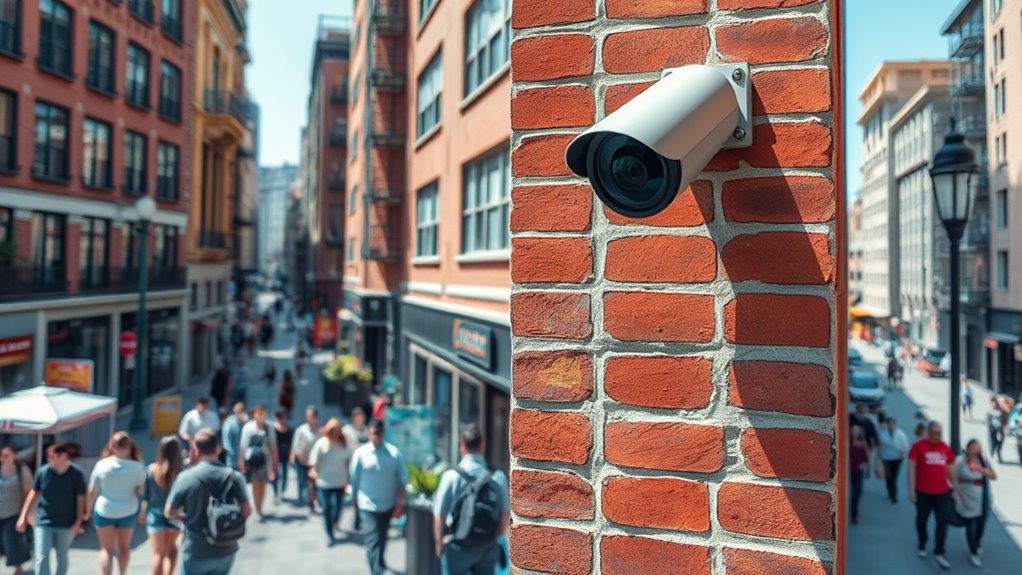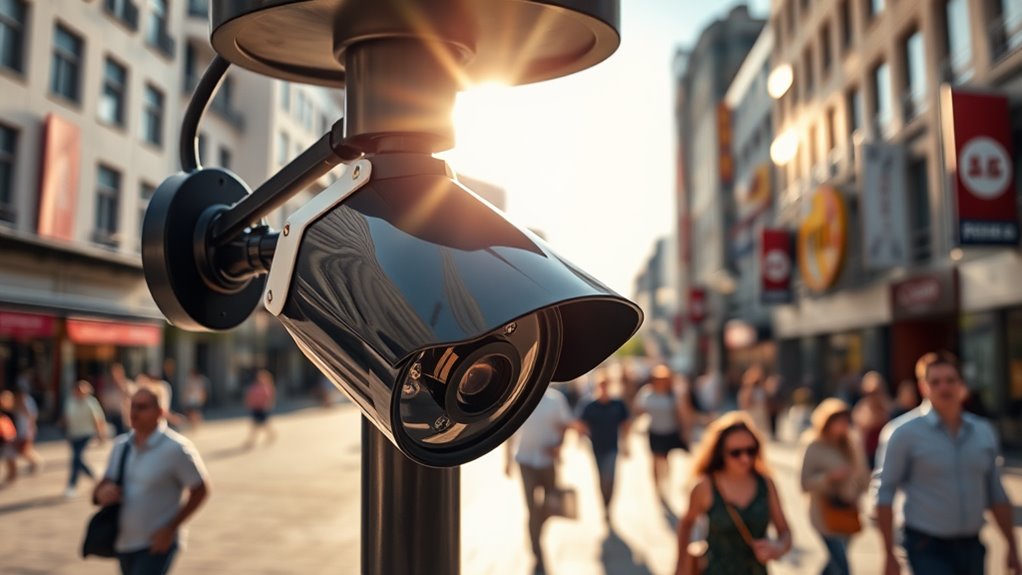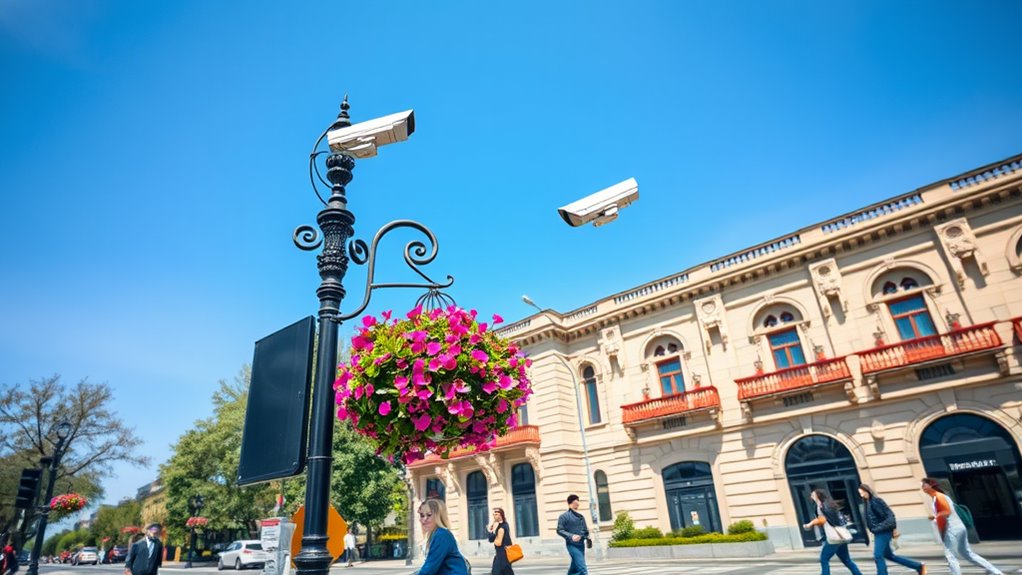You can legally use dummy cameras in public spaces, but it depends on local laws and regulations. Some jurisdictions require permits, even for non-functional devices. Regulations might dictate where these cameras can be placed and whether you need signage indicating potential surveillance. While dummy cameras aren't subject to the same level of scrutiny as real ones, understanding local legal implications is essential. Keep in mind that the use of dummy cameras raises privacy concerns and ethical issues, potentially leading to erosion of trust in community security measures. Discover more about how they impact public perception and security strategies.
Understanding Dummy Cameras

Dummy cameras, often referred to as decoy or fake cameras, are non-functional surveillance devices designed to mimic real security cameras. You might consider using them as a cost-effective security measure, but how do they stack up against their functional counterparts? When you look at a functionality comparison, the differences become clear. Real cameras actively record and monitor, providing tangible evidence if an incident occurs. Dummy cameras, however, lack any recording capability, serving only as a visual deterrent.
In terms of effectiveness assessment, you should weigh the pros and cons. Dummy cameras can be effective primarily because they create the illusion of surveillance. If someone with ill intentions spots what appears to be a security camera, it might discourage them from committing a crime. But remember, this effectiveness hinges solely on the perception of the observer. If a potential intruder determines a camera is fake, its deterrent value vanishes.
You should also consider the limitations. Dummy cameras don't capture footage, so if an incident does occur, you won't have any evidence to aid an investigation. This lack of functionality could leave you exposed if a crime is committed. Additionally, savvy criminals may soon recognize the static nature or lack of wiring associated with these fakes, reducing their deterrent effect. The solar-powered dummy camera with a motion-activated flashing LED, for example, offers a more convincing appearance of functionality, potentially enhancing its deterrent effect.
The flashing LED feature on some dummy cameras, like the Dummy Dome Camera, helps enhance the illusion of functionality by simulating the appearance of a working camera.
Ultimately, while dummy cameras can be part of a broader security strategy, relying on them exclusively isn't advisable. They work best when complemented by real cameras, ensuring both a deterrent presence and the capability to record and respond to incidents effectively.
Legal Frameworks and Regulations
When steering the use of dummy cameras, how does the legal landscape impact your choices? It's essential to understand that while dummy cameras can be a cost-effective deterrent, they're not free from legal scrutiny. Legal guidelines vary by jurisdiction, and it's important to familiarize yourself with local laws to guarantee you're not inadvertently stepping outside legal boundaries.
Often, the same laws governing real surveillance cameras apply to dummy cameras, necessitating a thorough check of regional statutes and ordinances. Regulatory compliance is a key factor. You must determine whether your intended use aligns with local security regulations. Some areas might require permits for any type of surveillance installation, including dummy ones. Ignoring these requirements can lead to fines or other legal consequences.
Furthermore, regulations may dictate where cameras can be placed, especially in public spaces where privacy expectations might influence legal interpretations. It's also essential to reflect on signage requirements. In some jurisdictions, even dummy cameras must be accompanied by clear signage indicating surveillance, as failing to do so might mislead the public and breach legal standards. This approach guarantees transparency and helps maintain public trust.
Additionally, be mindful of liability issues. If a crime occurs in an area under the supposed watch of a dummy camera, you could be held accountable if individuals relied on perceived security that wasn't actually there. As a result, evaluating the legal framework and adhering to regulatory compliance not only protects you from legal troubles but also upholds ethical responsibility in public space management. The Bullet Style IR Dummy Camera operates with a constant flashing red LED light, which might require special attention to local laws regarding simulated surveillance.
Always consult legal experts to stay informed and compliant. Self Defense Products LLC, the company offering dummy cameras, emphasizes the importance of understanding laws and restrictions when using such products.
Privacy Concerns and Ethical Issues

In the bustling world of public spaces, the presence of cameras, real or fake, raises significant privacy concerns and ethical issues. When you walk through a park, shop in a mall, or wait at a bus station, the thought of being monitored might cross your mind. Even if a camera's a dummy, the ethical implications remain. You might wonder if your movements are being tracked, and whether your right to privacy is being compromised.
The ethical implications of using dummy cameras are vast. On one hand, they can deter crime and promote safety, which is a positive aspect. On the other hand, they can lead to a false sense of security. You might think an area is being actively monitored when it's not, impacting your decisions and behavior. This raises questions of honesty and transparency. Are you comfortable with the idea of being deceived, even if it's for a greater good?
Surveillance ethics come into play here. When authorities or businesses use cameras, they've a responsibility to respect your privacy and be transparent about their surveillance practices. With dummy cameras, there's often no clear indication that you're not actually being recorded. This lack of clarity blurs the lines of ethical surveillance, making it difficult for you to know when and where you're being watched. Some companies, like Self Defense Products LLC, offer a variety of dummy camera options that highlight the importance of understanding their use and implications.
Ultimately, while dummy cameras might serve a purpose, they also challenge fundamental surveillance ethics and privacy rights. As you navigate public spaces, consider how these devices impact your freedom and trust in the environment around you.
Public Perception and Misleading Effects
Imagine strolling through a city square, feeling at ease with the supposed security the cameras offer. You trust that these silent watchers guard against potential threats, enhancing your sense of safety.
But what if some of those cameras are mere dummies? These fake devices can have a significant impact on public trust and the perceived effectiveness of surveillance.
When people notice cameras, they often assume they're being monitored, which can deter criminal activity. However, if it becomes known that many cameras are fake, this trust can erode. You might start questioning the reliability of other security measures in place. The very purpose of surveillance—to provide safety and deter crime—gets undermined when the public realizes they might be relying on false security.
Additionally, the misleading effects of dummy cameras can lead to a false sense of security. You could become complacent, thinking the cameras are actively recording and protecting you. This misplaced confidence might make areas seem safer than they actually are, potentially putting people at risk.
Moreover, the existence of dummy cameras can affect how communities perceive their local authorities. If the use of fake cameras becomes public knowledge, you might feel deceived, leading to a breakdown of trust between the community and those responsible for public safety.
This erosion of trust can have a lasting impact, making it harder for authorities to implement effective surveillance measures in the future.
Ultimately, while dummy cameras might seem like a cost-effective solution, their impact on public trust and the true effectiveness of surveillance is complex and potentially harmful.
Alternatives to Dummy Cameras

As technology advances, there are more effective alternatives to dummy cameras that maintain public trust and assure genuine security. Instead of relying on fake devices, consider investing in real cameras that offer true surveillance capabilities. Real cameras provide tangible evidence in case of incidents, guaranteeing that you can respond appropriately when needed.
With high-definition video and advanced features such as night vision, motion detection, and remote access, these cameras enhance the safety of public spaces considerably.
When deploying real cameras, opt for thorough security systems that integrate various technologies. These systems can include alarms, access control, and even facial recognition, allowing for a multilayered approach to security.
By choosing a fully integrated system, you not only deter potential wrongdoers but also assure a faster and more efficient response to any security breaches. This proactive measure contributes to a safer environment and instills confidence in the community.
Moreover, it's important to communicate the presence of real cameras and security systems to the public. Clear signage can deter criminal activity and reinforce the notion that the area is under genuine surveillance.
Transparency about security measures also helps build trust, showing that you're committed to the safety and well-being of everyone in the vicinity.
Frequently Asked Questions
Can Dummy Cameras Deter Criminal Activities Effectively in Public Spaces?
You might think dummy cameras deter crime effectively, but their deterrent effectiveness often relies on public perception. If people believe they're real, they can work temporarily. However, once discovered, they lose credibility, reducing their impact considerably.
What Are the Costs Associated With Installing Dummy Cameras?
When considering dummy cameras, you'll find installation costs are generally low since they don't require complex wiring. However, maintenance expenses can add up over time, particularly if you're aiming to maintain the illusion of functionality.
How Often Should Dummy Cameras Be Maintained or Replaced?
Did you know that 60% of people feel safer with visible cameras? Regularly check dummy camera effectiveness every six months to maintain positive public perception, ensuring they look real and functional, replacing any worn or damaged units promptly.
Are There Any Technological Advancements in Dummy Camera Design?
You're wondering about dummy camera technology, right? Recent advancements have made them more realistic, with designs mimicking real cameras closely. They've got blinking LED lights, motion sensors, and even weatherproof casings, enhancing their deterrent effect markedly.
Do Insurance Companies Offer Discounts for Using Dummy Cameras?
Like a Trojan horse, dummy cameras can be deceptive. Insurance companies typically won't offer discounts for them due to legal considerations. Real security cameras, with their clear insurance policies, are more likely to earn you savings.
Conclusion
So, you've got your dummy cameras all set up in public spaces, thinking you're the next great security guru. But wait, are they even legal? Imagine this: a plastic detective guarding the streets, fooling no one but itself. While you might dodge a few regulations, privacy concerns will hover like a nosy neighbor. Instead of relying on your fake camera army, why not explore real solutions? After all, cardboard cutouts rarely catch the bad guys.




